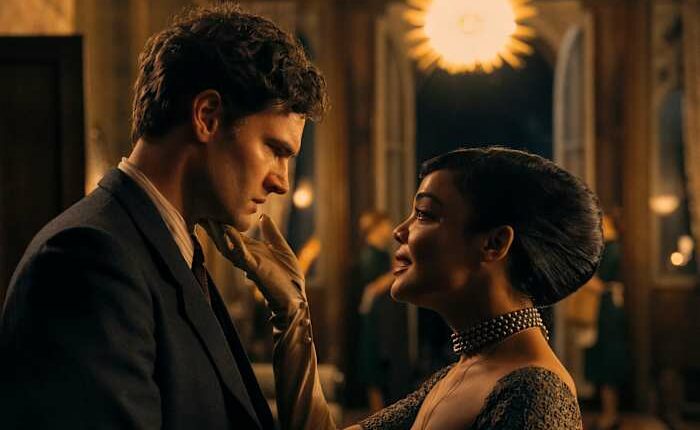Share this @internewscast.com

TORONTO, ONT – When Nia DaCosta first encountered Ibsen’s play “Hedda Gabler” during drama school, it left a strong impression. However, upon watching a performance of it, DaCosta felt that something was lacking.
“I thought, ‘Oh, that didn’t hit as hard as I anticipated,’” DaCosta recalls. “I realized that I had a specific vision of what aspects of the text I wanted to emphasize.”
Over a decade later, and following her work on the Marvel Studios film “The Marvels,” DaCosta premiered her interpretation of “Hedda” at the Toronto International Film Festival on Sunday. Starring Tessa Thompson, this film is a fresh adaptation of the 1890 play, enriched by a deep insight into, though not a justification of, the enduring character of Ibsen’s heroine.
“Although I am fascinated by Hedda, she remains indefensible and unrepentant,” DaCosta expressed during an interview in Toronto just before the film’s debut. “Yet, she holds validity.”
“Hedda,” being distributed by Amazon MGM Studios, is set to be released in theaters on October 22 and available for streaming on Prime Video a week later. The film relocates the story from 19th-century Norway to 1950s England, but this is not the most pivotal change that DaCosta, who also penned the screenplay, introduces.
In DaCosta’s rendition, Hedda Gabler is portrayed as a closeted queer character. She’s impulsively married George (played by Tom Bateman) merely as a matter of convenience. During a party at their grand estate, Hedda expertly orchestrates the interactions among her guests over one disastrous night brimming with martinis, sharp exchanges, and darker, underlying hazards.
Among the guests are Eileen Lovborg (the extraordinary German actor Nina Hoss, who played Hedda in a 2013 stage production). She’s a former lover of Hedda’s, and a character who, in the play, is a man. Lovborg arrives, newly sober and ascendant in her career as a writer and professor, along with a new girlfriend, Thea Clifton (Imogen Poots).
That adds up to an Ibsen adaptation of competing portraits of women, all constricted by societal pressures and responding to their plight with various degrees of honesty, courage and tragedy.
“I wanted to center three women as opposed to it being Hedda and all of these men,” DaCosta says. “Everyone tries to give Hedda a reason why she’s the way she is, but I’m like: Look a this other woman who has similar issues in terms of what she’s been told to do, how to live her life, marrying someone. Hedda hates that she’s done what she could never do.
“For me, the question is: What happens to a woman? What’s womanhood?
The film was one of the most anticipated premieres of TIFF in part because it gives Thompson, the 41-year-old actor of “Creed,” “Passing” and DaCosta’s 2018 directorial debut, “Little Woods,” a grand and complicated role in which to play a wide spectrum of emotion.
“What Ibsen did really brilliantly at the time he was writing was paint a portrait of a woman who was stuck between a life that in some ways she chose and in some ways was chosen for her, a woman hemmed in by societal expectations, a woman hemmed in by her own fear of scandal,” Thompson says.
“And I think in our adaptation there are still colors of that,” she adds. “But what Nia has done brilliantly is to widen the story, especially in making Lovborg a woman in this case, too, so you really get a trifecta, a triangle, of these three woman and you get to explore three different paths to female agency.”
By contrast, DaCosta, the filmmaker of 2021’s “Candyman” and the upcoming “28 Years Later: The Bone Temple,” has charted a path in the film industry all her own that’s made her particularly resistant to pigeonholing. She first wrote a draft of “Hedda” in 2018 but waited until she had the clout to make it.
“I put it in a drawer,” she says. “Did ‘Candyman.’ Did ‘Marvels.’ ‘Marvels’ was supposed to be 22 months. It ended up being three and a half years.”
Making “Hedda” continued to be a passionate goal of DaCosta’s, a movie that in many ways she’s been building toward.
“I think a lot about is what freedom looks like. Not just as an artist but as a person of color, as a Black person in America,” says DaCosta. “How do you live free? For me personally, as it relates to my career, I was very preoccupied of getting to a point where I’d be free enough to make what I want to make without a ton of interference, without compromising so much that it’s not my vision.”
Copyright 2025 The Associated Press. All rights reserved. This material may not be published, broadcast, rewritten or redistributed without permission.











